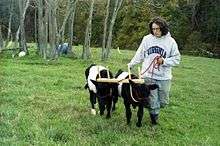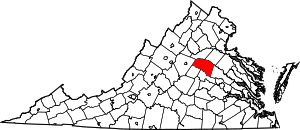Living energy farm
Living Energy Farm, or "LEF," is a zero fossil fuel intentional community of four adult members, some interns, plus three children (as of 2020)[1] on 127 acres in rural Louisa County, Virginia.[2] The farm is a Community in Dialogue with the Federation of Egalitarian Communities. It is 9 miles from Twin Oaks Community which helped support LEF when it was being founded.

Purpose
LEF is a "neo-Amish"[2] farm and educational center.[3] The farm grows crops and maintains orchards utilizing the methods of organic horticulture. Because of its fossil fuel avoidance, Living Energy Farm is working to develop alternative fuel for farm machines, such as turpentine.[2]
The building and homes on the property are "green,"[2] insulated and built with low-tech, local materials such as straw bales, rocks, and clay. Photovoltaic electricity, composting toilets, and greywater systems are integral to the community. In the winter, solar heating warms the living spaces, and natural cross ventilation cools the buildings in the summer months.[2]
The community sustains itself financially by growing seeds for organic seed companies, selling organic fruits and vegetables[2] and offering classes to the public.[3]
Other Energy Usages
For food preparation, members of Living Energy Farm utilize several technologies, including thermal storage, wood pyrolysis, solar cookers and biogas.
Steam power and non-battery solar energy (a DC micro-grid) satisfy other general energy needs. Bicycles, carpooling, and public bus are used for transportation.[2]
The community has internet access and cell phone service, with charging through DC 12 volt solar batteries.[2][3]
Outreach
LEF hosts interns in an educational program covering diverse areas of modern sustainable living. The community aims to teach people, especially youths, about the importance of sustainable technology in context (i.e. when and where such technologies are effective and when they are not).[3]
